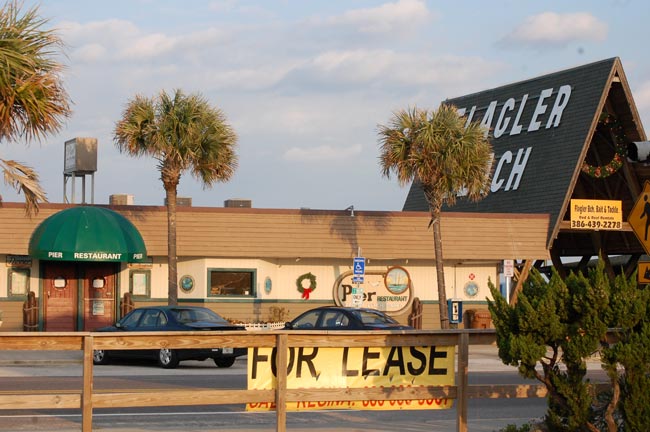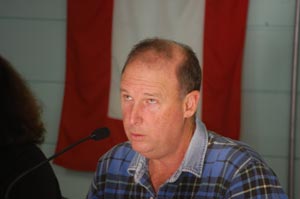
Negotiating a restaurant lease with a potential term of 25 years is by definition taxing on the two sides involved. Negotiating publicly, and with one of the two sides consisting of no less than six individual elected officials (plus their lawyer and their top administrator), approximates low-grade torture. That was the scene this afternoon as the Flagler Beach City Commission conducted line-by-line negotiations with Raymond Barshay, the Ormond Beach restaurateur who’s spent more than the past year trying to convince the commission to let him take over the city’s iconic Pier Restaurant and transform it into the dining destination it hasn’t been for years under current management.
Click On:
- Greasy Spoon No More? Flagler Beach Ready to Negotiate New Lease for Pier Restaurant
- Barshay Lease, With Mark-Ups
- Barshay Business Plan
- Cost Estimates for Repairs (Upson Enterprises)
- “They Don’t Give a Damn”: Flagler Beach Wants Pier Restaurant Owners Who Do
- Ormond’s River Grille Owner Closer to Taking Over Flagler Beach’s Pier Restaurant
- Great Ocean View, Fun Pier, 5,000 Landlords. $3,329/mo. (Big Chains Need Not Apply)
- Consultant’s Full Report
- Barshay’s July Proposal
- Barshay’s April Proposal
- The Pier Restaurant “White Paper”
Negotiations were arduous and inconclusive on several matters, down to the days when the restaurant may be permitted to close, whether Barshay would run the next-door Bait and Tackle Shop, and what percentages of the restaurant’s gross sales the city would be entitled to. The city owns the property. It’s been leased to Katalin Meyer since 1988. Meyer wants to sell to Barshay, with slightly more than a year left on her lease. Barshay has an agreement with her, though the city has never seen anything in writing from Meyer that she is, in fact, willing to sell (she’s reversed course in the past, after being willing to sell).
With few exceptions, the wrangling was constant. “We’re sitting up here trying to dictate to a business owner how to run his business, and that’s no our job,” Commissioner Joy McGrew said at one point, when the sides were hung up over the restaurant’s hours of operation. The commission wanted those hours relatively precise, with breakfast, lunch and dinner offered on every day of the year but Christmas and three other holidays of Barshay’s choice. Barshay balked, looking for more flexibility. Finally, the commission’s consultant, Jim Densmore, intervened—as he did several times over the course of the afternoon—to remind commissioners of the deference they owed the “trust factor” before dictating such detailed terms to a business owner.
“I’m not here on a holiday and this is my hobby. I can’t play golf at night,” Barshay, who owns the River Grille in Ormond Beach, said. “So I think I need some latitude, yeah.”

First-year rent would be set at $36,000 for the first two years, increasing by 2.5 percent in years three and four, then by 3 percent—or the rate of inflation, whichever is higher—in subsequent years. The city would also get additional payments of 2 percent of gross sales over $1 million in the first two years, rising to 3 percent in subsequent years.
The 3 percent increase in base rent (or the inflation rate multiplier) may end up being a deal-breaker. Barshay is uncomfortable with those terms. The sides agreed to write them in for now, but they’ll still be negotiated—as will many other matters once the city makes its formal offer to Barshay: today’s negotiating session is merely a basis for future negotiations, not the final word on what the lease will look like.
A deck may or may not get built. Barshay had originally proposed it. “I think it’s a critical item,” Barshay said. But the city would have to build it. There was wild disagreement over the cost: some commissioners came up with a $50,000 figure (at $30 a square foot for a deck), while a $500,000 figure had previously been cited. “We may never be able to build it. We may not get permitted,” Commission Chairman John Feind said.
In fact, in n 1965, the city envisioned building just such a deck, even drew up the plans. The Department of Environmental Protection more recently told ActinG Manager Caryn Miller that “there should be no problem with this deck,” Miller said. “The only thing that might hold it up is construction during turtle season.”
“I don’t know that I want to pay for it. You’re going to own it,” Barshay said, balking at the commission’s lawyer’s suggestion that the $50,000 cost (if that’s what it proves to be) could be amortized over 10 years, and added to Barshay’s monthly rent. The sides agreed to leave that issue “nebulous,” in Feind’s words.
There’s also the matter of $41,000 in necessary maintenance for the building, to bring it up to current standards. The city is asking Meyer to make good on the interior repairs she owes. But the city is not likely to get out of Meyer what it hasn’t been able to get out of her for several years. And Barshay, of course, doesn’t want to pay for the city’s mistakes. “We’ve done nothing, nothing, for the last 20 years,” McGrew said of the city’s own poor upkeep of the building. “We’ve just inherited a 20-year-old, broken down nag.” The city, in other words, is not about to restore the building without making a substantial investment of its own. Barshay doesn’t want to be the city’s savior on that score.
The meeting began with a long disquisition by Commissioner Steve Settle, who, basing himself on a proposed base rent of $36,000 a year, outlined several points to conclude on this one: “We’re lucky if we’re going o break even under this lease.” He got some applause from the audience, which was an audience at that point. But after the commission’s late-afternoon break, Settle (and Mayor Alice Baker) were gone, too.
At 6:30, Feind read the last of the 51 segments of the lease.
What’s next is a re-drafting of the lease by the commission’s and Barshay’s attorneys. The sides will then review it and set yet another special meeting. The attorneys, however, will not be settling the final questions. Those will still have to be worked out in that additional special meeting (or possibly an item on the commission’s regular meetings). “At least most of the items will be done, and we’ll argue about two or three things,” Feind said. “We’ve agreed, we’ve reached consensus on a lot of items.”
Barshay appeared in agreement, but cautiously.
But Feind asked Barshay to at least make a decision, before the next meeting, about the money to be spent on upgrading the building, and on the year-over-year multiplier above the base rent. “Our only area of question i the deck and how we’re going to approach the deck,” Feind said.
“He’s going to do a lot for this community, and if you can work all of these other issues out, he’ll be a great asset,” Jim Densmore, the city’s consultant, said.
It won’t be until at least January 13 when the commission will either discuss the lease again, or set another special meeting. Wednesday’s meeting adjourned five hours 22 minutes after it began, at 6:52.






























Jollymon says
Ummmm . . . not to put too fine of a point on this, but what on earth is the City Commission doing negotiating the provisions of this lease? Isn’t that what a city manager and a city attorney is for? Why is the City Commission involving itself in the day-to-day operations of the city, i.e. negotiating contracts and leases? The Commission should let the acting/interim city manger and city attorney negotiate the deal and then bring it to the Commission for review and approval/denial. Perhaps the City Commission members would find a more valuable use of their time reviewing the City’s charter to refresh themselves as to what their roles are in the overall operation of the City. I suspect they will find that it is mainly legislative, with some quasi-judical powers, and some minimal oversight authority. I wouldn’t imagine they would find much in the way of administrative or executive powers, which is apparently what they are trying to engage in.
Imagine trying to negotiate a contract with 6 different elected officials, who are apparently not speaking as one entity or through one representative but are each individually negotiating on behalf of their own agendas/constituents! Insanity! Kudos to Mr. Barshay for toughing it out. I can see why it is time for some real change in leadership in the City of Flagler Beach.
Tip: If the City Commission (for whatever reason) feels it needs to have representation in the lease negotiations, then it should appoint one commission member to sit in on the negotiations with the city manager and the city attorney.
Thomas Kaspar says
I sent it on to Hooters Restaurant Development its perfect for them if they modified for breakfast . It should never be done half assed over and over . Its dependent on A1A traffic to survive not the locals , and it has always been the case and the problem .
TK
LUCKY says
jollymon is right, insanity. one commissioner at most, def the city mgr & city attorney’s area of responsibility. btw, standard yearly increases for restauants/nightclubs, bars etc is 5% per year and i bet Barshay knows it. The city shouldn’t rollover but should send a message to all area businesses by making it easier for Barshay to come to town. i’ve been to the river grille in ormond, he runs a really nice place there and he should be encouraged to operate here.